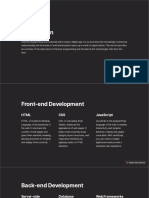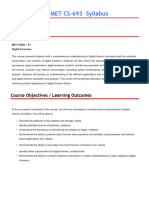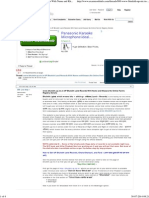0% found this document useful (0 votes)
11 views10 pagesBasics of Internet Web Development Fundamentals
This document provides an overview of web development fundamentals, covering essential concepts such as browsers, URLs, HTTP vs HTTPS, core web technologies (HTML, CSS, JavaScript), web servers, domain names, website structure, and cookies. It explains how these elements work together to create and manage websites effectively. Additionally, it highlights the importance of user experience and privacy considerations in web development.
Uploaded by
abhishekrushitradersCopyright
© © All Rights Reserved
We take content rights seriously. If you suspect this is your content, claim it here.
Available Formats
Download as PPTX, PDF, TXT or read online on Scribd
0% found this document useful (0 votes)
11 views10 pagesBasics of Internet Web Development Fundamentals
This document provides an overview of web development fundamentals, covering essential concepts such as browsers, URLs, HTTP vs HTTPS, core web technologies (HTML, CSS, JavaScript), web servers, domain names, website structure, and cookies. It explains how these elements work together to create and manage websites effectively. Additionally, it highlights the importance of user experience and privacy considerations in web development.
Uploaded by
abhishekrushitradersCopyright
© © All Rights Reserved
We take content rights seriously. If you suspect this is your content, claim it here.
Available Formats
Download as PPTX, PDF, TXT or read online on Scribd
/ 10
























































































